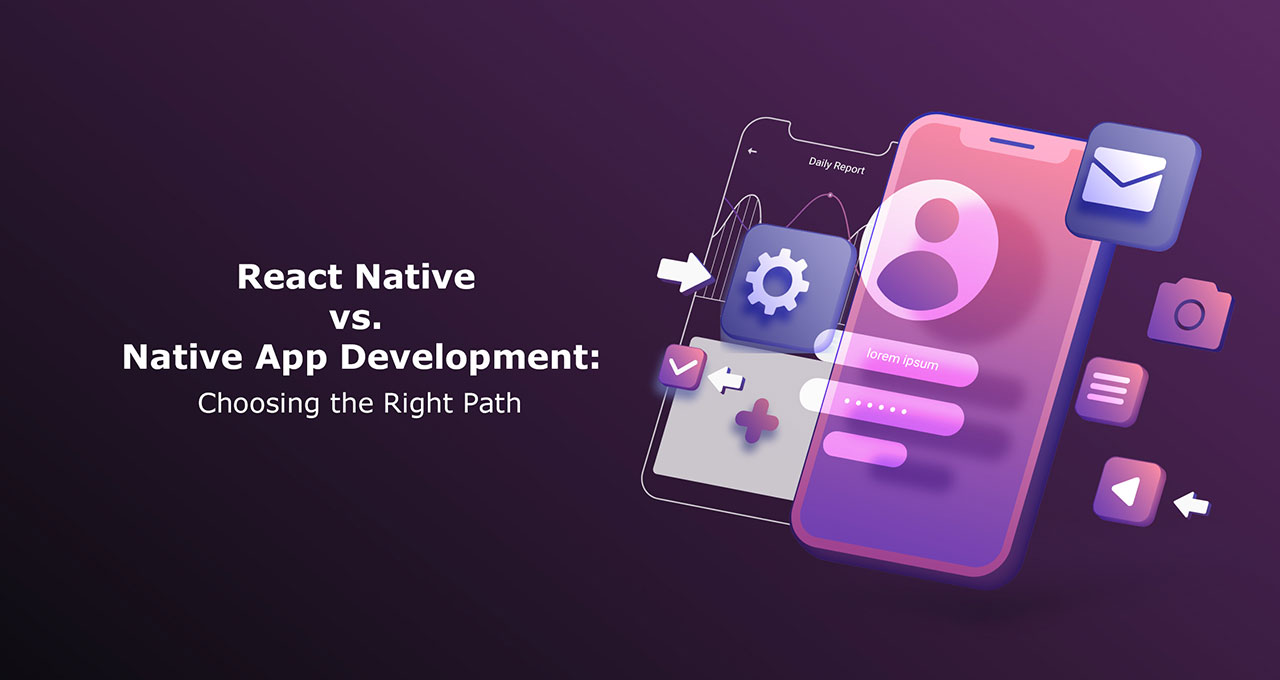
Image Credit: Image by Freepik
In today’s digital landscape, mobile app development has become a crucial aspect for businesses to thrive. With the increasing demand for apps on both Android and iOS platforms, the choice between React Native and Native app development has become a significant decision. This article aims to provide a comprehensive analysis of the two approaches and assist you in making an informed choice.
Understanding React Native and Native Development
When it comes to app development, there are two primary approaches: React Native and Native development.
React Native
React Native is a cross-platform framework developed by Facebook (now Meta) that allows developers to build mobile applications for both Android and iOS platforms using a single codebase. It leverages JavaScript and offers a wide range of pre-built components for faster development. React Native has gained popularity among developers due to its ability to save time and effort by allowing code reuse across platforms. Examples of React Native apps can be observed through our successful projects undertaken with Creative Galileo and Alemac.
Native Development
Native Development involves building separate applications for each platform using platform-specific programming languages such as Swift for iOS and Java or Kotlin for Android. Native apps provide optimal performance and access to all native features and APIs of the respective platforms. Examples of Native apps can be observed through our successful projects undertaken with Healthi and Zapak.
Pros of React Native Development
One of the key advantages of React Native is its ability to create cross-platform apps with a single codebase. This means that developers can write code once and deploy it on both iOS and Android platforms. This not only saves development time but also reduces costs associated with maintaining separate codebases for each platform.
Another major benefit of React Native is its performance. By leveraging native components, React Native apps can deliver a near-native experience to users. The framework allows developers to build apps that are fast, responsive, and provide a seamless user experience (UX).
React Native also offers excellent code reusability. Developers can reuse a significant portion of their code across different platforms, resulting in faster development cycles and easier maintenance. This is particularly beneficial for businesses looking to launch their apps quickly and efficiently.
Cons of React Native Development
While React Native offers several advantages, there are some drawbacks to consider. One of the main concerns is the performance comparison between React Native and native app development. While React Native apps can achieve near-native performance, they may still fall short in terms of raw performance and memory utilization. This can be a critical factor for apps that require intensive computations or real-time interactions.
Another potential drawback is the limited access to platform-specific APIs. React Native provides a bridge to access native APIs, but it may not cover all the functionality available in native development. This can be a limitation for apps that heavily rely on platform-specific features.
Pros of Native Development
When it comes to Native App Development, there are a number of advantages which make it a popular choice for many businesses. One of the key benefits of Native App Development is the access to native libraries and API’s. This means that developers are able to take advantage of pre-built components that allow them to quickly create high-quality, reliable applications.
Another advantage of Native App Development is the efficient and fast performance. Because native apps are developed specifically for a particular operating system, they can take full advantage of all the hardware and software features available. This results in a smoother and more efficient performance as compared to apps that are developed using cross-platform technologies.
Native App Development also offers maximum customization. This is due to the fact that developers have complete control over the code and can build custom features or tweak existing ones to make the app more aligned with the business’s goals. This provides an opportunity to create a unique and tailored experience for users.
Cons of Native Development
Firstly, it’s important to note that native app development can be a significantly more expensive process. Building two separate codebases for iOS and Android can easily double the development costs compared to creating a single cross-platform app using frameworks like React Native. Furthermore, maintaining two separate codebases means that updates can be time-consuming and costly.
Any feature that’s added or issue that needs fixing has to be done twice, adding to the overall timeline and costs of the project. Lastly, separating the codebase also means dealing with platform-specific issues. Each mobile platform has a different set of rules and regulations that have to be adhered to. This can lead to redundancies in the code, further bloating the application, and making it harder to manage.
Factors to Consider in Choosing the Right Approach
Development Time
The development time is a crucial factor to consider when choosing between React Native and Native development. Native development requires separate teams for Android and iOS, resulting in longer development cycles. On the other hand, React Native allows developers to write a single codebase for both platforms, reducing development time significantly.
Mobile App Cost
Cost is another important consideration in app development. Developing an app with React Native can be more cost-effective compared to Native development, as it eliminates the need for separate development teams. With React Native, you can save up to 30-35% of the development cost while achieving the same functionality as Native apps.
UI/UX Experience
The user interface (UI) and user experience (UX) are critical factors in app development. Native apps have an advantage in terms of UI/UX experience as they can be designed individually for each platform, adhering to platform-specific design guidelines. React Native, although it offers reusable components, may face challenges in achieving the same level of UI/UX consistency across platforms.
Scalability
Scalability is an important consideration for apps that require processing a large amount of data or frequent updates. React Native provides developers with opportunities for scaling the application and launching higher-functionality updates. Native development, on the other hand, may require additional effort and resources for scaling the app across platforms.
Performance
Performance is a critical aspect of app development. Native apps, developed using platform-specific languages, have an edge over React Native in terms of performance. Native apps can fully utilize the device’s capabilities, resulting in faster processing, better graphics support, and smoother animations. React Native, being based on JavaScript, may face limitations in performance and compatibility with certain native features and advanced hardware devices.
Long-Term App Scope
Long-term app scope is a consideration for the sustainability and future updates of the app. Native apps, supported by Google and Apple, receive regular updates and tools to implement new functionalities without affecting the app’s usability. React Native may face challenges in keeping up with the updates and tools released by Apple and Google, potentially affecting the app’s long-term prospects.
API and Third-Party Libraries Support
Native app development frameworks have direct access to all types of APIs, allowing developers to incorporate complex functionalities seamlessly. React Native has limited API accessibility and may require the use of native modules or third-party libraries to implement certain advanced functionalities.
App Security
App security is a critical aspect of app development. Native app development languages, such as Swift, Java, and Kotlin, are known for their strong typing and object-oriented programming principles, making them more secure. React Native, being based on JavaScript, may have certain vulnerabilities and challenges in identifying errors and loopholes in the development process.
App Maintenance
App maintenance is an ongoing process in app development. Native app maintenance requires attention to bugs and updates for both Android and iOS platforms separately. React Native app maintenance is relatively easier, as resolving bugs on one platform is usually sufficient, unless native app support is specifically required.
When to Choose React Native for Mobile App Development
After considering the factors mentioned above, React Native is a suitable choice in the following scenarios::
- Building a simple and uniform app across platforms.
- Targeting both Android and iOS platforms with a limited budget.
- Requiring an early market entry to validate the app idea.
- Developing social media or e-commerce apps.
- Integrating Facebook ads into the app.
When to Choose Native for Mobile App Development
Native app development is recommended in the following scenarios:
- Developing complex applications, especially those with advanced functionalities like messaging apps.
- Requiring regular updates and seamless integration with native features.
- Focusing on delivering an exceptional native user experience.
- Building utility apps that heavily rely on native device features or IoT-based applications.
- dfdfdf
- Developing apps for specific platforms or industries with unique requirements.
Conclusion
Choosing between React Native and Native app development requires careful consideration of various factors such as development time, cost, UI/UX experience, scalability, performance, programming language, long-term app scope, interactivity with native apps, API support, app security, and maintenance. Each approach has its own strengths and weaknesses, and the choice ultimately depends on the specific requirements and goals of your app project. By understanding these factors and analyzing your app’s needs, you can make an informed decision that aligns with your business objectives and delivers the best user experience.
At GoPhygital, we specialize in creating elegant and high-performance React Native and Native apps that meet your specific requirements. Let us help you bring your app idea to life. You can reach out to us here.

